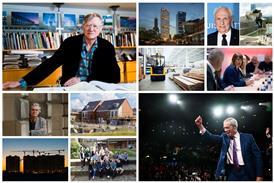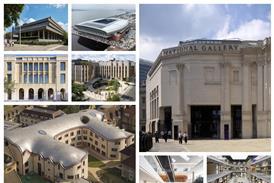The covid-19 crisis has changed the way we work but it could also alter our attitude to the place where we live, Eleanor Jolliffe writes

Like many others, I am now eight months into working from home with no obvious end in sight. I have repeatedly been impressed by the versatility of my colleagues and how quickly those both within the office and the large consultant team I am working with have adapted, and continue to adapt.
There are many challenges associated with working from home; however, this is not the column to moan about how many tension headaches I get from being on Zoom calls all day. I wanted instead to consider the longer term impact of working from home on our cities and society.
>> We’ll look back and-spot the monuments to this terrible time
Developer Colm Lacey told Building Design a few weeks ago of his fear that “when this stuff gets developed in three years’ time there will be a whole bunch of ‘lockdown schemes’ devoid of joy and personality. We may even recognise these as monuments to this terrible time.”
I do understand his point. I miss the collegiate nature of our studio – and still go in for a day once every few weeks. The cross-pollination of ideas was a very real and valuable thing when we all worked together in one building.
While entirely working from home robs us of so much richness, an increased proportion of people working from home could bring real benefits to our cities
Now information gathering is very focused and I think a certain richness has been lost. While I would not go so far as to say there will be some grim monuments to this time, I do think there is a possibility that some of the spirit of place may be lost.
While entirely working from home robs us of so much richness, an increased proportion of people working from home could bring real benefits to our cities. It may even help to rejuvenate local high streets and villages – as people stay closer to home, footfall increases in local centres and the resulting natural surveillance and community atmosphere Jane Jacobs writes of so eloquently may bring life back to quiet suburbs and country towns.
Working from home may also lead to better space standards in new homes and an increased enthusiasm for high-quality outdoor spaces. Being at home for increased periods has given us all times when we wish to curl up in peace and quiet – cocooned from the realities of the world unfolding outside the front door.
This, alongside the acoustic benefits of closing a door between you and a parter/housemate on a Zoom call, may lead to a change in the way we subdivide space and reduce the popularity of fully open-plan living. To attempt to crowbar my natural optimism into a trying year, perhaps we will come out of this with better homes and a better quality of living.
There may also be an argument that the increasing role of working from home may have societal consequences far beyond space standards or better green space. In her book The Making of Home, historian Judith Flanders makes the point that the industrial revolution changed the way we classify work by moving “real” work outside of the home.
Up until the industrial revolution almost all work was done from home (carpentry, piecework, tailoring, professional services etc). This was industrialised and moved out into factories, workshops and later offices.
As more aspects of our lives recentre within our homes, will it impact not only the national space standards or local high streets but our attitudes to doing the washing up?
As a result the work that remained within the home became de-valued to the point that it no longer counted as work (cooking, cleaning, growing vegetables, raising children, keeping livestock etc). This disproportionally impacted women’s roles and had a significant impact on the widening of the gender pay gap; it tended to be the roles that men had traditionally taken that were moved out into specialised spaces, given greater status and therefore were more generously remunerated.
As working from home becomes more common, those specialised spaces may become increasingly less important. As more aspects of our lives recentre within our homes, will it impact not only the national space standards or local high streets but our attitudes to doing the washing up?
I wonder if, alongside changing expectations of how homes should function, this pulling into our homes more aspects of our day-to-day existence may cause society to start to re-frame caring, cooking and cleaning as a valuable calling and profession? As the next few months unfold, it may even re-frame the way we go about practising architecture.
















No comments yet